

Emmerich de Vattel: The Law of Nations. "Nihil est enim illi principi Deo qui omnem hunc mundum regit, quod quidem in terris fiat, acceptium, quam concilia coestusque hominum jure sociati, quæ civitates appellantur.
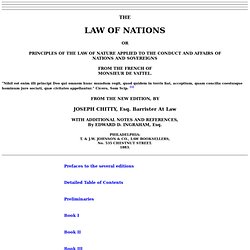
" Cicero, Som Scip. [1] JOSEPH CHITTY, Esq. Barrister At Law WITH ADDITIONAL NOTES AND REFERENCES, By EDWARD D. INGRAHAM, Esq. PHILADELPHIA: T. & J.W. . [1] Should be: Nihil est enim illi principi deo, qui omnem mundum regit, quod quidem in terris fiat, acceptius quam concilia coetusque hominum iure sociati, quae civitates appellantur. Rendered into text and HTML by Jon Roland of the Constitution Society. Text Version | Liberty Library | Home. Vattel: The Law of Nations: Prefaces to the various editions. Preface to the 1999 Digital Edition This digital edition is taken from the 1883 printing of the 1852 edition of Joseph Chitty, which contained numerous typographical and spelling errors which have been silently corrected.
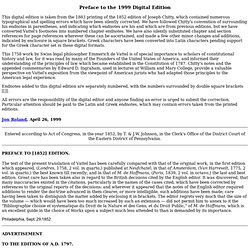
We have followed Chitty's convention of surrounding his endnotes in parentheses, and indicating which endnotes are his and which are from previous editions, but we have converted Vattel's footnotes into numbered chapter endnotes. We have also silently substituted chapter and section references for page references wherever these can be ascertained, and made a few other minor changes and additions, indicated by enclosure in square brackets. Greek characters have been converted into Latin characters pending support for the Greek character set in these digital formats. Endnotes added to this digital edition are separately numbered, with the numbers surrounded by double square brackets [[]]. Vattel: The Law of Nations: Contents. PRELIMINARIES.
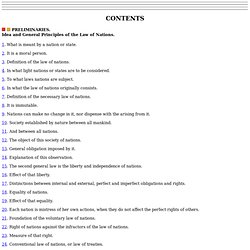
Idea and General Principles of the Law of Nations. 1. What is meant by a nation or state. Vattel: The Law of Nations: Preliminaries. § 1.
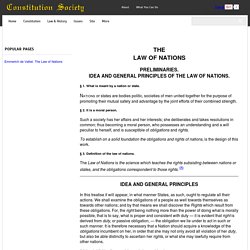
What is meant by a nation or state. Vattel: The Law of Nations: Book I. § 1.
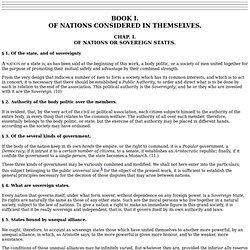
Of the state, and of sovereignty A NATION or a state is, as has been said at the beginning of this work, a body politic, or a society of men united together for the purpose of promoting their mutual safety and advantage by their combined strength. From the very design that induces a number of men to form a society which has its common interests, and which is to act in concert, it is necessary that there should be established a Public Authority, to order and direct what is to be done by each in relation to the end of the association. This political authority is the Sovereignty; and he or they who are invested with it are the Sovereign. (10) Vattel: The Law of Nations: Book II. § 1.
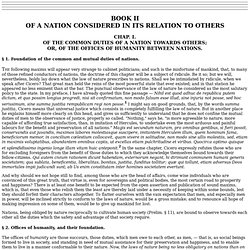
Foundation of the common and mutual duties of nations. THE following maxims will appear very strange to cabinet politicians; and such is the misfortune of mankind, that, to many of those refined conductors of nations, the doctrine of this chapter will be a subject of ridicule. Be it so; but we will, nevertheless, boldy lay down what the law of nature prescribes to nations. Shall we be intimidated by ridicule, when we speak after Cicero? That great man held the reins of the most powerful state that ever existed; and in that station he appeared no less eminent than at the bar. And why should we not hope still to find, among those who are the head of affairs, come wise individuals who are convinced of this great truth, that virtue is, even for sovereigns and political bodies, the most certain road to prosperity and happiness? Vattel: The Law of Nations: Book III. § 1.
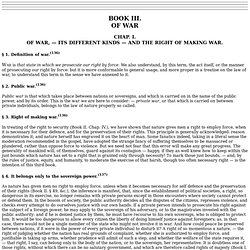
Definition of war.(136) WAR is that state in which we prosecute our right by force. We also understand, by this term, the act itself, or the manner of prosecuting our right by force: but it is more conformable to general usage, and more proper in a treatise on the law of war, to understand this term in the sense we have annexed to it. § 2. Public war.(136) Vattel: The Law of Nations: Book IV.
§ l.
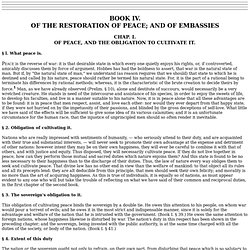
What peace is. PEACE is the reverse of war: it is that desirable state in which every one quietly enjoys his rights, or, if controverted, amicably discusses them by force of argument. Hobbes has had the boldness to assert, that war is the natural state of man. But if, by "the natural state of man," we understand (as reason requires that we should) that state to which he is destined and called by his nature, peace should rather be termed his natural state. Vattel Index. This page is still under construction.

In it present state, it represents raw OCR output before corrections are made, saved as an HTML file. The large number of errors are due the the rough quality of the original print, combined with the low resolution of the scan (110 dpi, or fax resolution, where 300 dpi is normal and recommended). If anyone would like to volunteer to clean it up, I would welcome the assistance. Index ABSENCE.S&e Country. ol the riQht of individuals to quit thoir country, 103. Vattel: The Law of Nations: Commentary. Young Gentlemen, In lecturing on the Law of Nature and Nations, I have not flattered myself that I should make a class of profound international Jurists.
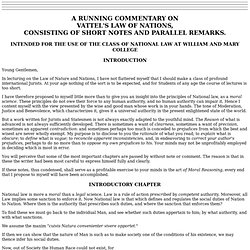
At your age nothing of the sort is to be expected, and for Students of any age the course of lectures is too short. I have therefore proposed to myself little more than to give you an insight into the principles of National law, as a moral science. These principles do not owe their force to any human authority, and no human authority can impair it. Hence I content myself with the view presented by the wise and good man whose work is in your hands. But a work written for Jurists and Statesmen is not always exactly adapted to the youthful mind. You will perceive that some of the most important chapters are passed by without note or comment. If these notes, thus condensed, shall serve as a profitable exercise to your minds in the art of Moral Reasoning, every end that I propose to myself will have been accomplished.